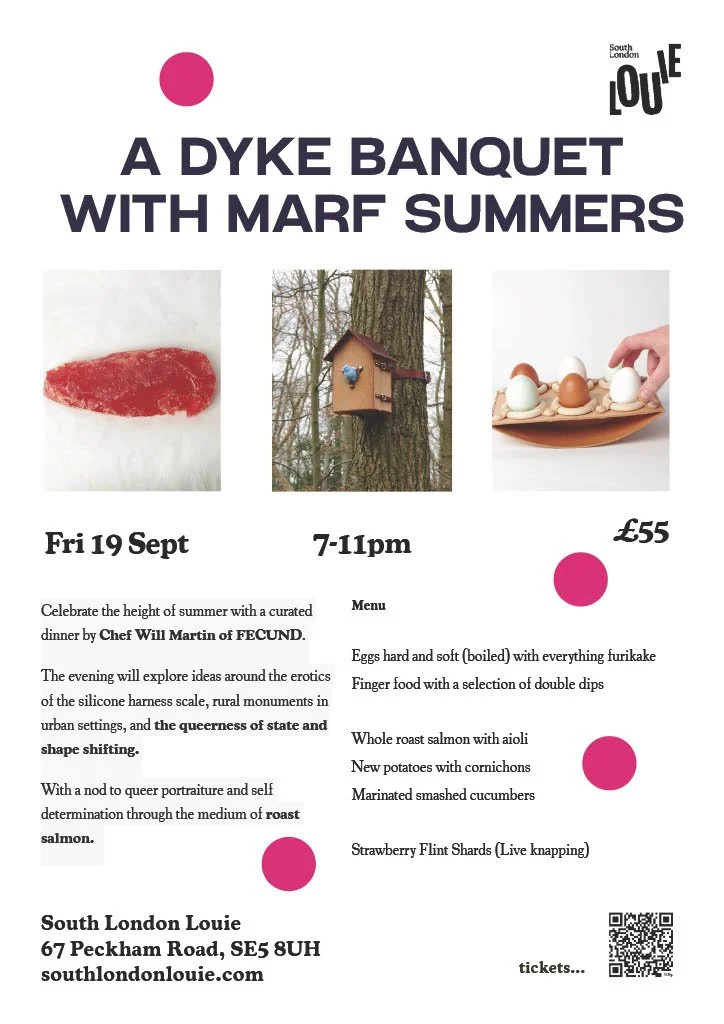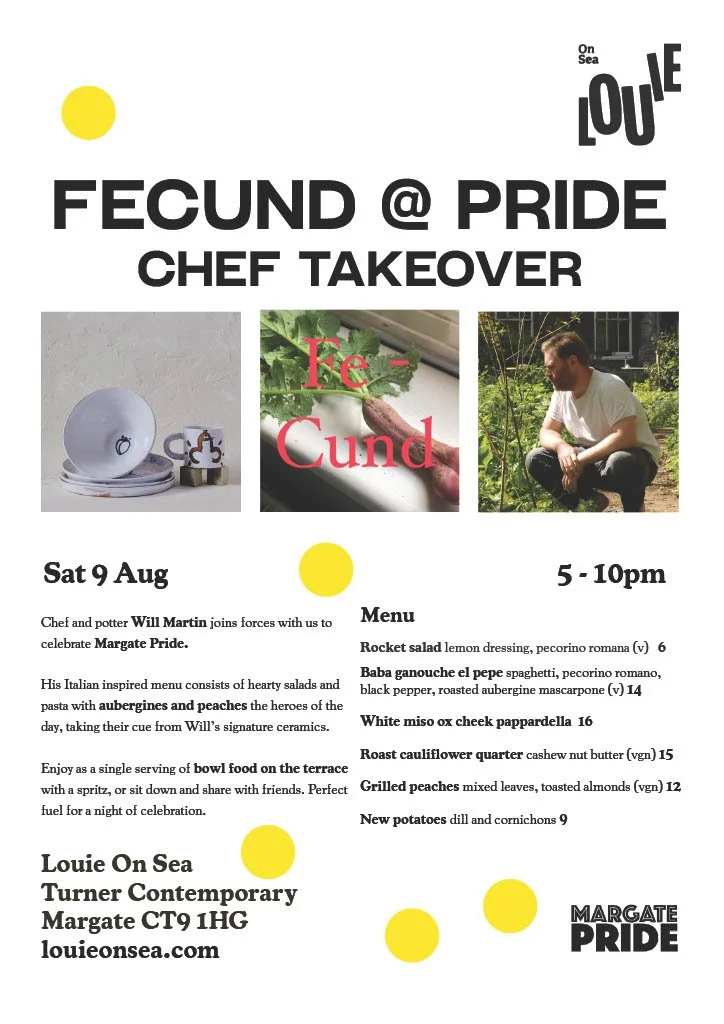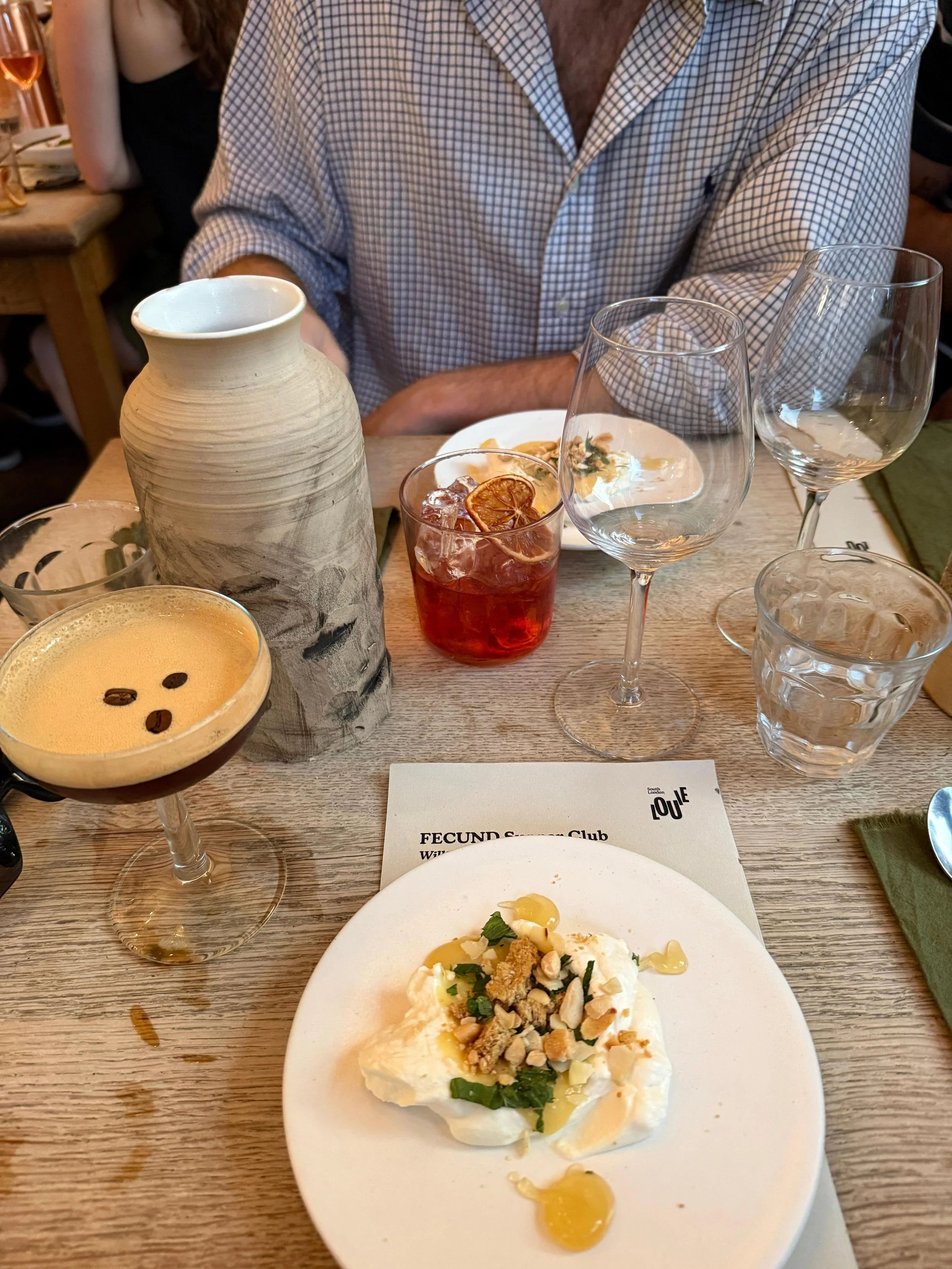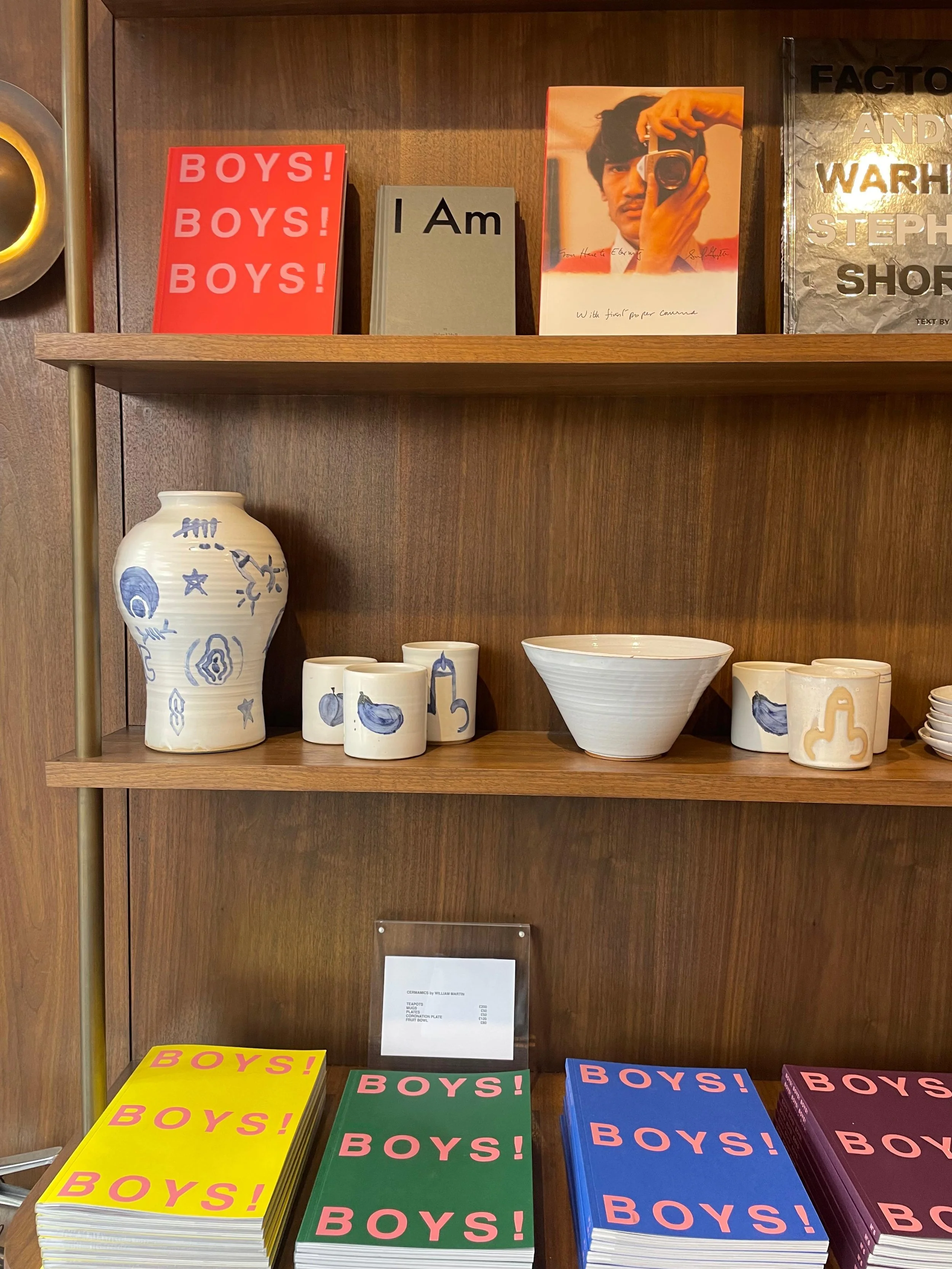Fecund: Adjective
Pronunciation: /ˈfek.ənd/ or /ˈfiː.kənd/.
Highly fertile, or capable of producing an abundance of offspring, crops, or vegetation. Intellectually productive or creative, a "fecund imagination". Synonymous with fertile, fruitful, and prolific.
FECUND is a monthly Supper Club held at South London Louie in Camberwell. It was created by William Martin to platform other Queer creatives and encourage real life connections. The tableware and menu are designed to communicate the featured artist’s practice, creating an immersive, narrative enviroment. Will produces all the food and tableware within walking distance of the venue, prioritising local and queer owned produce.
Upcoming Dinners and Events
Celluloid Dreams with
Charles Moriarty
28th March 2026
South London Louie
65 Peckham Rd, London SE5 8UH
Come celebrate Charles Moriarty’s latest publication ‘Brock’ with a three course meal inspired by his 25 year practice.
Menu:*
Welcome Drink
Dumpling Soup
Chicken, Broccoli and Rice
Knickerbocker Glory
Step inside Charle’s dream world of musicians, body builders and memento mori. Collectors gift bags and limited edition ceramics available for pre order and collection on the night.
*vegetarian options available on request

Previous Events
Gigantic: A Dyke Banquet
19th September
South London Louie
65 Peckham Rd, London SE5 8UH
Menu:
Finger food with a selection of double dips
New potatoes with cornichons
Marinated smashed cucumbers
Whole roast salmon with aioli
Strawberry Flint Shards (Live knapping)
FECUND celebrates the changing seasons at South London Louie with a curated dinner by Will Martin and Marf Summers. The evening will explore ideas around the erotics of the silicone harness scale, rural monuments in urban settings, andshape shifting.
FECUND @ Pride
Chef Take Over
9th August, 5 - 10 pm
Louie on Sea, Turner Contemporary
Margate, CT9 1HG
Very excited to announce that I will be doing my first pop up at Louie on Sea during Margate Pride. Located inside the Turner Gallery, it’s the perfect spot to grab some tasty plates and pre party before heading out. Otherwise pop in after the festivities and refuel with a roasted salad or slow cooked pasta
I’ll be serving in my new range of plates and bowls featuring delft Aubergines and Peaches, as well as celebrating them at the high of their season in the dishes themselves. Enjoy as a single serving while dancing and chatting, or order a few dishes to share at a table. Live DJ and plenty of wine served in my custom carafes. All tableware will be available for sale on the night.
My Best Friends’ Wedding
Antipasto: Shitake brodo shot with mushroom duxelles crostini
Primo: Pendergast family linguine marinara with lacto-fermented tomatoes and pecorino romano
Secondo: Beef short rib braised in guinness, with cacio pepe polenta and oregano salmoriglio
Contorno: Summer leaves with pecorino
Dolce: Castella cake with mandarin and yuzu syrup
FECUND presents My Best Friends’ Wedding.
What started as DIY wedding quickly turned into a curated collection of contemporary artists, bakers, tailors and florists. Each component was hand made by a close friend or family member. Will Martin contributed the vases and wedding favours (obviously). The happy couple now invite you experience the day with a fine dinning twist as the Pendergast / Shovlins debut their first solo supper club together.
FECUND
Amuse Bouche: Charred aubergine mascarpone on charcoal cracker with padron peppers
Starter: Cape Malay pickled fish, reimagined by Mikey Pendergast
Mains: Roast chicken rice of your dreams served as donburi with a soft boiled egg and herbs
Dessert: Lemon curd, chantilly cream and almond crumb
Vegetarian options available on request.
Will Martin is a chef & artist who creates immersive experiences using food and ceramics. These collaborative art events are created under the name Fecund and are an extension of his practice. Together with chef Mikey Pendergast they return to South London Louie to celebrate Midsummers with an unconventional anthology of best loved dishes.
Dance to your Daddy
At the South London Gallery
Porcelain Plates (Sold Out)
This Dinner was inspired by British folk songs of the North East and used local suppliers within walking distance of the Gallery. The matte porcelain plates were made at the nearby community studio Urban Potters while the flowers were foraged by the florist near his houseboat on the way to the venue. Stuart Fenwick has a degree in ethnomusicology and performed a selection of folk songs from his home town on the fiddle.
The Leftovers
At Museum of the Home
Paper Plates (Sold Out)
Imagining a dinner made of leftovers for close friends the day after Christmas. These plates were perfect for the slightly kitsch and camp theme of Turkey Curry Buffet at the Museum of the Home.
These dinners were done in support of the Queeriosities makers fair and helped raise funds for both the Museum and the makers.
Cruising Dinner
At Camberwell Grove with Everything Now Design
London Clay Bottles (Sold Out)
This dinner was held in my garden to platform queer architectural practice Everything Now Design, using materials we had gathered together from a documented walk around Hampstead Heath. Each bottle in unique, hand painted using foraged clay, ash from the artists supper clubs and reclaimed porcelain from his studio.
The Queeriosities Dinners
At Museum of the Home
Dick Plates (Sold Out)
Emblematic of our Queeriosities Dinners
at The Museum of the Home in 2023,
these handmade plates are painted in the traditional Delft technique, with the whole dinner drawing inspiration form the 90s roomset colour palette of blues and yellows.
Erotic City
At Studio Prokopiou
Carved Bowls (Sold Out)
Inspired by Studio Prokupiou’s depictions of Marsyas the Faun, these porcelain bowls are made on the potters wheel and then cut, scratched and sliced, resulting in unique and tactile surfaces. This theme was reflected in the food, with slow pulled goats legs and a moussaka made with thinly sliced aubergine
Coming In
At Columbia Road
Cobalt Urn (Available on Request)
Handbuilt out of porcelain and sprayed with pure cobalt, the white chain shadows, reminiscent of a cyanotype, hanging above mobile porcelain chains.
It was a focal point at the closing dinner for Coming In, with a menu inspired by Will’s childhood memories of home cooked meals.































